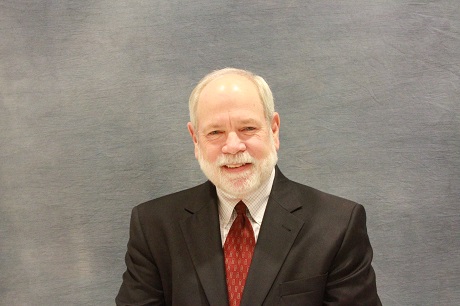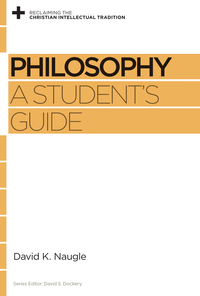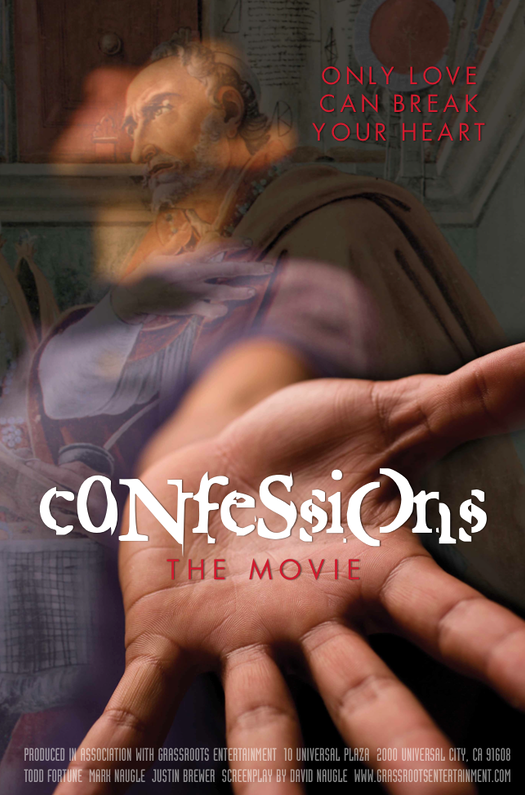
As I shared in Interview: David Naugle on Worldview, I’ve engaged in periodic conversation with David Naugle for quite some time to wrestle with “the heart” and the history of worldview. His recent publication Philosophy: A Student’s Guide (Crossway, 2012) caught my attention as a valuable and short introductory resource (128 pages). As with the previous interview, I take full responsibility for the related pictures and links 🙂

Tom: David, Thank-you for once again sharing your time, gifts, and insights with us! I have really appreciated your earlier contributions regarding Worldview: The History of a Concept (Eerdmans, 2002) and Reordered Love, Reordered Lives: Learning the Deep Meaning of Happiness (Eerdmans, 2008).
Philosophy: A Student’s Guide (Crossway, 2012) came to my attention when a colleague handed me a stack of publications from Crossway’s Reclaiming the Christian Intellectual Tradition series. Wow! Please share with Emerging Scholars the genesis of this series, it’s purpose, and the intended audience of your piece in particular?
David: Tom, my own involvement began when the chief editor of the series, Reclaiming the Christian Intellectual Tradition (RCIT), Dr. David Dockery, asked me to write the volume on philosophy. The original and continuing desire was to have a series of books on the major academic disciplines like the Council for Christian Colleges & Universities (CCCU) series (say, Music through the Eyes of Faith) and the Intercollegiate Studies Institute (ISI) series on the major disciplines.
The name RCIT gets at the purpose of the entire series to reclaim or recover the Christian Intellectual Tradition via rigorous Christian scholarship and thought (there is a rich, if neglected tradition, there to be mined). I wanted my contribution on philosophy to be distinctively Augustinian such that faith in Jesus renews and restores the actual philosophic task: a Christ shaped philosophy. To use Augustine’s often quoted words: “Unless you believe you will not understand.”
ISI’s book on philosophy was Thomistic; the CCCU didn’t have one on Philosophy. So there was a room for my volume and contribution. The Augustinian notion is captured well in the idea of an assumed Christian faith that is integrated with a discipline). My school, Dallas Baptist University, like most in the CCCU, is an Augustinian university. I hope that my book, which deals with philosophy, is helpful to students of all kinds and especially to Christian students, teachers, and professors. My book contains my advice to Christian philosophers (Alvin Plantinga started this!).
Tom: How did you settle on and organize “the essentials” to be offered in a student guide on philosophy that is only 128 pages? What are some wider audiences than philosophy students who may benefit from reading Philosophy: A Student’s Guide? What encouragement have you received about your piece and/or the series as a whole?

David: Well, I over-wrote considerably. At first, the volume was 269 pages (way too long and I knew it); I whittled it down to 140 pages (still too long), and the editor said to make it even shorter. So I did, and there were some beautiful footnotes with beautiful sources and insights on the cutting room floor.
I think that anyone, of faith or not, could benefit especially from the issue I raise in the first chapter on Prolegomena. Philosophers too often assume they can objectively ascertain what they are after, but prefatory matters of whatever kind, are influencing the outcome. As I quote a theologian in the book, “Show me your prolegomena, and I can predict the rest of your theology.” The same is true in any discipline, philosophy included.
The whole process has been significantly encouraging to me! I have been asked to speak several times on the book at several schools and conferences, and I have often chosen to speak on the importance of prolegomena and the vocation of Christian scholars, the first and last chapters of the book.
Aside from that, I investigate the bearing of God the Trinity and creation on metaphysics, the role of the Bible in epistemology, what being created in God’s image means for philosophical anthropology, the implications of God’s love and justice and His entire nature on ethics or moral philosophy, and, finally, the impact of God as creator on human creativity and the use of the imagination (there are apologetic implications here – imaginative apologetics!).
Tom: What an amazing process David. Thank-you for peeling back the finished copy and giving us an insider’s perspective on the editing process. Getting back to the big picture (not that some of the topics you’ve mentioned are not the big picture!), what three or four points do you desire every reader to take away from Philosophy? What points do you consider particularly important for those considering next steps in higher ed? Any particular “characters” or “perspectives” Emerging Scholars should be sure to read up on and be prepared to interact with?

David: Tom, I do hope that Christian thinkers of all kinds recognize the impact of philosophic concerns on ALL disciplines. I hope that Christian scholars recognize the impact of a biblical worldview on the vocations of Christian academics in all fields, especially in terms of the following:
- Christ’s incarnation, life, ministry, death on the cross (service and sacrifice)
- Christ’s ascension (prayers of Jesus at God’s right hand)
- Christ’s cosmic authority (Jesus is Lord)
- Christ’s gift of the Holy Spirit (Pentecostal power)
- Christ’s coming and judgment (being held accountable for our conduct as professors).

Since philosophy has been greatly influenced by Christianity lately, budding young philosophers would be remiss to neglect the important roles of thinkers like
- Nick Wolterstorff [1932- , Papers in Calvin’s Virtual Library of Christian Philosophy]
- Alvin Plantinga [1932- , Papers in Calvin’s Virtual Library of Christian Philosophy]
- William Alston [1921-2009, Papers in PhilPapers]
- J. P. Moreland [1948- , J.P.’s Library]
- William Lane Craig [1948- , Scholarly articles in Reasonable Faith]
- and many, many, many others.
A Baby Changes Everything sings Faith Hill at Christmas time, and that is certainly true in philosophy.
Tom: Any particular resources to commend to Emerging Scholars as they take next steps in growing more and more into the image of Christ Jesus, in particular as they interact with philosophy, whether that is their particular field or not?
David: I’d recommend books by young apologists like
- Travis Dickerson and Keith Loftin at Southwestern Baptist Seminary
- Philosophers like Doug Blount at Dallas Seminary
- John DePoe and Tim McGrew in the analytic camp.

Tom: Thank-you David! What a follow-up to Interview: David Naugle on Worldview. I look forward to hearing about this week’s presentations on worldview at Hope College and to connecting with you further over the summer. Hope we can have you back to share more. May God continue to bless your labors on behalf of the Kingdom of God—in particular bringing his salt, light, leaven and life through your labors. Particularly praying for your endeavors in the arts. To God be the glory!
Note to those who are members of and/or follow the Emerging Scholars Network:
- If you have not already done such (or you don’t remember the material addressed by them), I encourage you to set aside a few minutes to read the earlier interviews of David on Reordered Love, Reordered Lives: Learning the Deep Meaning of Happiness (William B. Eerdmans, 2008) and Worldview: The History of a Concept (William B. Eerdmans, 2002).
- In developing your summer reading list, be sure to draw perspective shaping material found in resources mentioned in this post, Hot off the Press: Campus Resources from IVP ’13, and ESN Blog Book Reviews. Note:
- All Eerdmans books qualify for the 20% ESN Member Discount.
- All IVP books qualify for the 30% ESN Member Discount.
- Thank-you for your prayers regarding how to further develop ESN’s partnership with IVP. Last Thursday I had an excellent conversation with Deborah Gonzalez, our IVP Representative. The 2014-2015 Campus Resource List is in motion. It will be ready for the fall and additional ideas are starting to take form. Stay tuned 🙂
- If you (and possibly a summer reading group of which you are a member) desire to write a book review and/or conduct an author interview, then please be in touch with me to explore this idea/opportunity further 🙂
- This week pray for David as he presents on worldview at Hope College.
To God be the glory!
Tom enjoys daily conversations regarding living out the Biblical Story with his wife Theresa and their four girls, around the block, at Elizabethtown Brethren in Christ Church (where he teaches adult electives and co-leads a small group), among healthcare professionals as the Northeast Regional Director for the Christian Medical & Dental Associations (CMDA), and in higher ed as a volunteer with the Emerging Scholars Network (ESN). For a number of years, the Christian Medical Society / CMDA at Penn State College of Medicine was the hub of his ministry with CMDA. Note: Tom served with InterVarsity Christian Fellowship / USA for 20+ years, including 6+ years as the Associate Director of ESN. He has written for the ESN blog from its launch in August 2008. He has studied Biology (B.S.), Higher Education (M.A.), Spiritual Direction (Certificate), Spiritual Formation (M.A.R.), Ministry to Emerging Generations (D.Min.). To God be the glory!

Leave a Reply